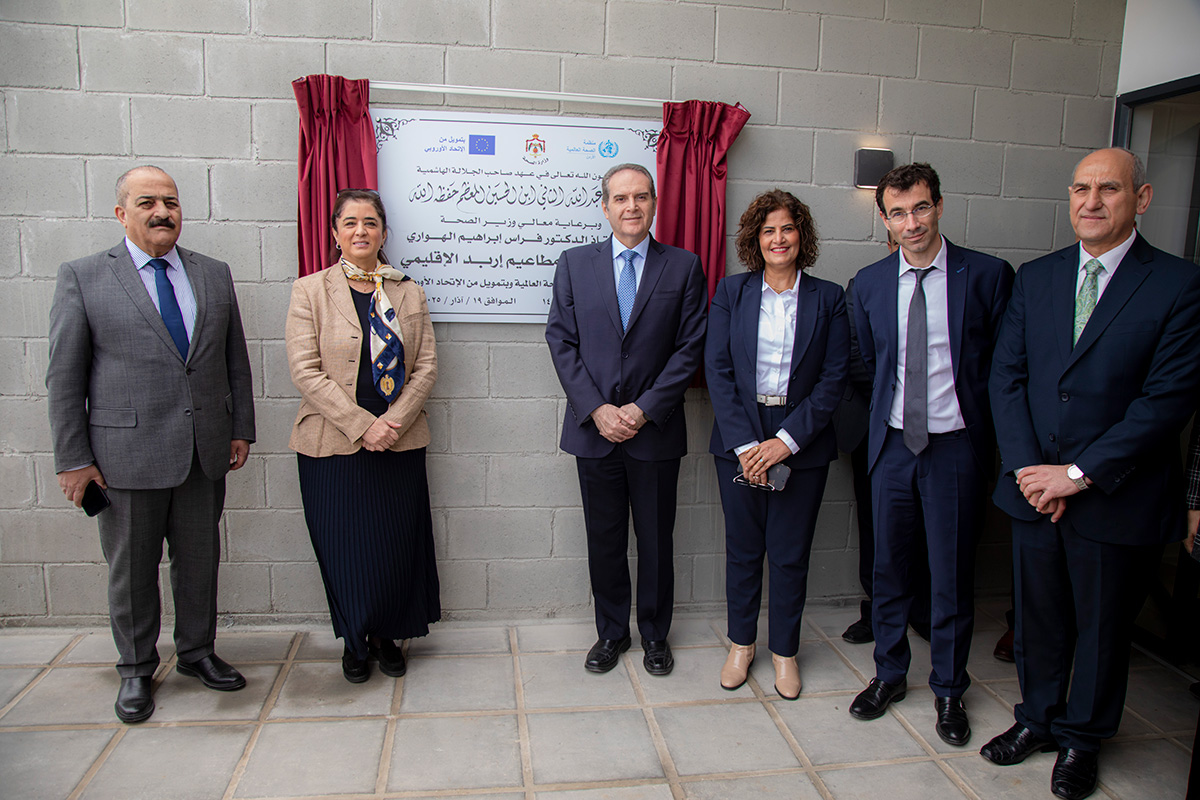 19 March 2025, Irbid, Jordan – Jordan’s health care infrastructure has been strengthened following the inauguration of the Northern Regional Vaccine Centre and the upgrade of 6 regional medical warehouses in Irbid Governorate.
19 March 2025, Irbid, Jordan – Jordan’s health care infrastructure has been strengthened following the inauguration of the Northern Regional Vaccine Centre and the upgrade of 6 regional medical warehouses in Irbid Governorate.
Launched under the patronage of H.E. the Minister of Health Professor Feras Hawari, the initiative was a collaboration between the Ministry of Health and the World Health Organization (WHO) Country Office in Jordan, with funding from the European Union (EU).
The inauguration event was attended by WHO Regional Director for the Eastern Mediterranean Dr Hanan Balkhy, European Union Ambassador to Jordan Pierre-Christophe Chatzisavas and WHO Representative to Jordan Dr Jamila Al-Raiby.
Efforts to modernize Jordan’s medical supply chains and ensure the efficient and equitable distribution of medicines and vaccines across the Kingdom are ongoing. The newly established vaccine centre and upgraded medical warehouses align with WHO’s international standards for supply chain management, a key pillar for achieving universal health coverage.
Enhancing vaccine storage and distribution
 The Northern Regional Vaccine Centre in Irbid covers 480 m2 and features state-of-the-art storage facilities, including 2 cold rooms with a combined capacity of 80 m3. Rooms for dry materials and medical supplies provide another 160 m3 of storage, ample space to support Jordan’s national immunization programme. The centre also houses 2 vaccination clinics and has the capacity to expand as needed. Built to the highest global standards, the facility enhances vaccine safety, reduces storage and distribution costs and supports health care services across Jordan’s northern governorates. Total investment in the facility amounted to approximately 400 000 Jordanian dinars.
The Northern Regional Vaccine Centre in Irbid covers 480 m2 and features state-of-the-art storage facilities, including 2 cold rooms with a combined capacity of 80 m3. Rooms for dry materials and medical supplies provide another 160 m3 of storage, ample space to support Jordan’s national immunization programme. The centre also houses 2 vaccination clinics and has the capacity to expand as needed. Built to the highest global standards, the facility enhances vaccine safety, reduces storage and distribution costs and supports health care services across Jordan’s northern governorates. Total investment in the facility amounted to approximately 400 000 Jordanian dinars.
Upgrading regional medical warehouses
The 6 upgraded regional medical warehouses provide a combined storage capacity of 2650 m3. Storage spaces are enhanced by a specialized racking system and 20% expansion potential for emergency needs. The facilities now include:
a 75 m3 cold room for refrigerated medicines;
central air conditioning and ventilation systems;
advanced security and fire safety systems;
a renewable energy system for environmental sustainability; and
a fleet of refrigerated medical transport vehicles.
The improvements facilitate the safe and efficient distribution of medicines and supplies to hospitals, primary health care centres and storage facilities across northern Jordan. The total cost of the upgrades is estimated at 850 000 Jordanian dinars.
Strategic vision for health care modernization
Minister of Heath Professor Hawari highlighted the project's alignment with Jordan’s economic modernization vision and the way it builds on other health care infrastructure developments, including the Ministry’s strategic medical stockpile warehouse in Zarqa’s Yajouz area which was inaugurated by His Majesty King Abdullah II last year. Additional storage facilities are also planned for southern Jordan and Amman.
EU Ambassador to Jordan Pierre-Christophe Chatzisavas underlined the EU’s commitment to supporting Jordan’s health care sector, saying: “The inauguration of these modern warehouses and the vaccine centre marks a crucial step towards achieving universal health coverage in Jordan. This initiative is part of a €43 million EU programme aimed at strengthening the medical supply chain and improving access to quality health care for both Jordanians and Syrian refugees.”
WHO’s commitment to strengthening medical supply chains
 WHO Regional Director for the Eastern Mediterranean Dr Hanan Balkhy highlighted the significance of the investments: “The availability of safe, effective, quality and affordable essential medicines and vaccines is fundamental to effective health care. These critical infrastructure investments are modernizing and strengthening Jordan’s medical supply chains, in line with WHO’s regional flagship initiative on expanding access to medical products.”
WHO Regional Director for the Eastern Mediterranean Dr Hanan Balkhy highlighted the significance of the investments: “The availability of safe, effective, quality and affordable essential medicines and vaccines is fundamental to effective health care. These critical infrastructure investments are modernizing and strengthening Jordan’s medical supply chains, in line with WHO’s regional flagship initiative on expanding access to medical products.”
“With the completion of these facilities by the end of March 2025, Jordan will have a national network of modern medical supply chain infrastructure that meets the highest international standards,” said WHO Representative to Jordan Dr Jamila Al-Raiby. “This initiative underscores the importance of strong partnerships and sustainable investment in public health to ensure uninterrupted access to essential medicines and vaccines.”
A more resilient health care system
The project is a milestone in Jordan’s ongoing efforts to ensure efficient, sustainable and equitable access to essential health services. By investing in resilient medical supply chains, Jordan is strengthening its health care system and enhancing preparedness for future health challenges.


